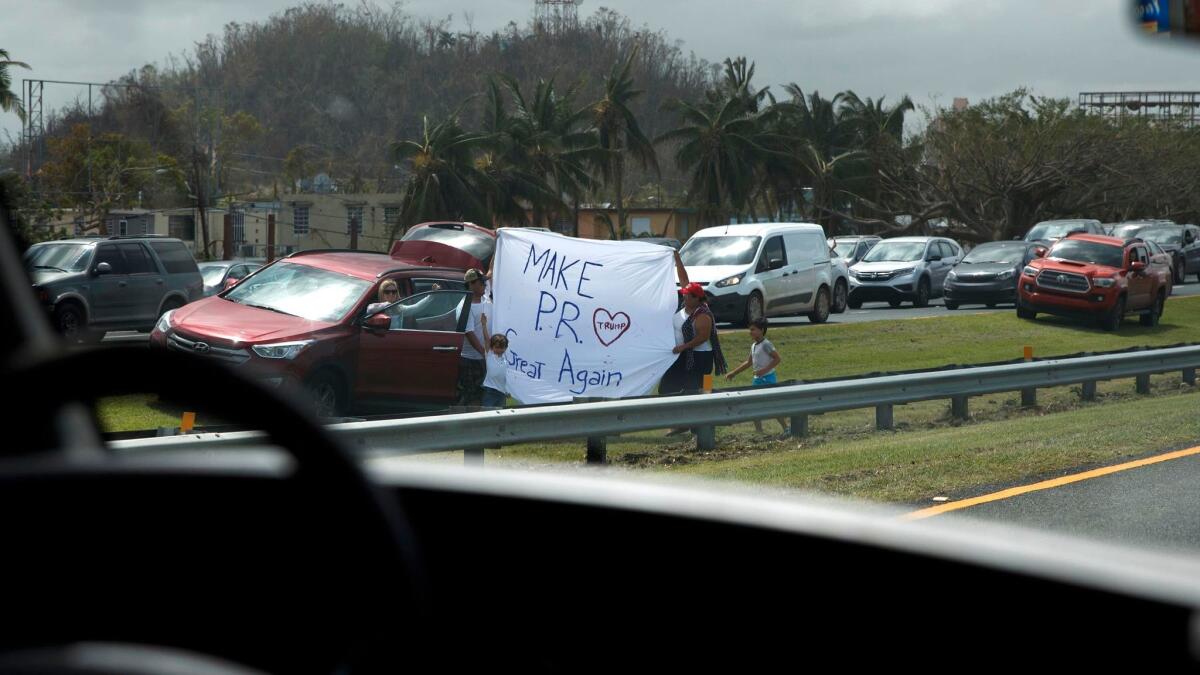Opinion: Complaining about the cost of Puerto Rico aid while pushing tax cuts took some gall — even for Trump

During a visit to storm-ravaged Puerto Rico, President Trump inadvertently disclosed that his administration does, in fact, have a budget.
“Now, I hate to tell you, Puerto Rico, but you’ve thrown our budget a little out of whack because we’ve spent a lot of money on Puerto Rico,” Trump said, adding, “And that’s fine. We’ve saved a lot of lives.”
The revelation of an actual budget comes as a surprise, given that it wasn’t mentioned by Trump, other administration officials or top congressional Republicans when they unveiled their outline last week for blockbuster tax cuts for businesses and individuals. In fact, there wasn’t even an estimate of the cuts’ cost — that detail (among many others) was left to Congress.
One nonpartisan group, the Tax Policy Center, offered its own estimate of the cost: $2.4 trillion over the coming decade, and $3.2 trillion in the decade after that. Backers of the outline said the center’s work had no credibility because it used guesswork to fill in important blanks and it ignored the economic growth the cuts would unleash. Maybe so, but the point, again, is that top Republicans are promoting a Brobdingnagian tax cut without any apparent concern for how much revenue it would sacrifice.
Let’s be honest, the federal government does a terrible job preparing fiscally for disasters.
If one is constrained by a budget, one would worry about that sort of thing. But the federal government is free to operate in the red — as it has every year since the late 1990s, when it briefly ran budget surpluses. (Even those surpluses may not have been real, if you factor in the money borrowed from a fund for future Social Security benefits.) And the only people who complain about deficits are those who are out of power (currently Democrats) or who aren’t being helped by the spending (e.g., compare how Republican Sen. Ted Cruz of Texas felt about budget-busting disaster aid after Hurricane Sandy hit the Northeast with his support for aid after Hurricane Harvey hit his own state).
Let’s be honest, the federal government does a terrible job preparing fiscally for disasters. Rather than approaching catastrophes the way an insurance company would, it basically waits for them to happen, then opens its checkbook. The annual budget for the Federal Emergency Management Agency is a joke. The national flood insurance program is based on actuarial fantasies.
But once you’ve made that your approach, it’s churlish to bring up budgets when disasters happen. And it’s particularly galling to do so while your administration is trying to push a gigantic tax cut through Congress.
Considering the source, the “you’ve thrown our budget a little out of whack” line was probably just a throwaway attempt at humor, a little teasing by the Troller in Chief. And in fairness, Trump has occasionally shown interest in shrinking the deficit — witness his support for slowing the growth in Medicaid spending. I’d add in the cuts his administration proposed to the State Department, the Environmental Protection Agency and an array of domestic programs, but those were offset by a huge proposed increase in defense spending.
Still, Puerto Rico was so hammered by Hurricane Maria that many of its residents may go weeks or months without clean water and electricity. These U.S. citizens didn’t throw the federal budget out of whack any more than the residents of Houston did. That’s the storms’ fault. Trump’s job now is to help get them all back on their feet. And if he’s bothered by the cost, he should come up with a better financial approach to catastrophic events than the one we’ve been using for decades.
Twitter: @jcahealey
More to Read
A cure for the common opinion
Get thought-provoking perspectives with our weekly newsletter.
You may occasionally receive promotional content from the Los Angeles Times.







